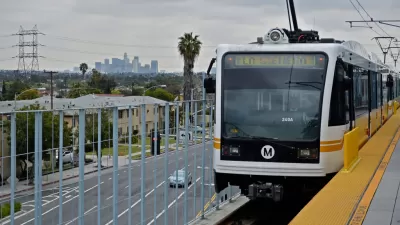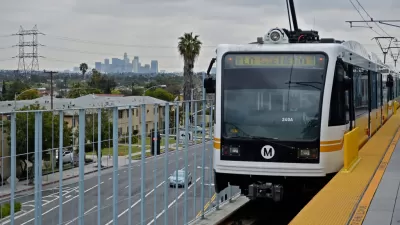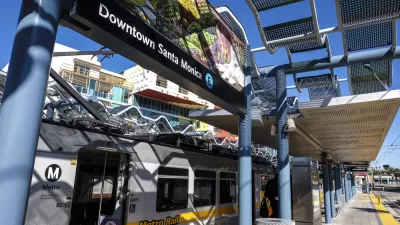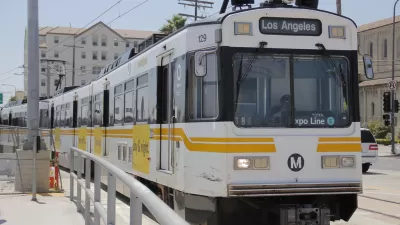After an inauspicious start, L.A.'s Expo Line may surpass its 2020 ridership projections by the end of this year. The line has proved popular with those headed to work, school, and entertainment destinations; without stealing riders from bus routes.

"When the Expo Line, Los Angeles Metro’s newest light rail line, opened in April 2012, initial ridership numbers were low, starting at around 11,000 per average weekday, a fact which many media sources reported on. One libertarian think tank even used these low numbers to argue that light rail systems in general should not be built," writes Axel Hellman.
"But now, one year later, the picture is very different. Ridership on weekdays has been increasing at a steady clip of about 1,000 per month, reaching an estimated 26,000 per day during the week. Given that Metro projected about 27,000 riders per day by the year 2020, that number is very good. The number of people riding the Expo Line may pass that benchmark in the coming months."
"A common criticism of light rail is that it diverts riders from buses and fails to draw drivers out of their cars," he adds. "This does not appear to be the case with the Expo Line. Metro’s publicly available ridership statistics show that bus routes that connect with the Expo Line, and routes that run along similar parallel corridors, all have maintained steady ridership numbers."
FULL STORY: One Year Later, Who Is Riding the Expo Line?

Maui's Vacation Rental Debate Turns Ugly
Verbal attacks, misinformation campaigns and fistfights plague a high-stakes debate to convert thousands of vacation rentals into long-term housing.

Planetizen Federal Action Tracker
A weekly monitor of how Trump’s orders and actions are impacting planners and planning in America.

Chicago’s Ghost Rails
Just beneath the surface of the modern city lie the remnants of its expansive early 20th-century streetcar system.

Bend, Oregon Zoning Reforms Prioritize Small-Scale Housing
The city altered its zoning code to allow multi-family housing and eliminated parking mandates citywide.

Amtrak Cutting Jobs, Funding to High-Speed Rail
The agency plans to cut 10 percent of its workforce and has confirmed it will not fund new high-speed rail projects.

LA Denies Basic Services to Unhoused Residents
The city has repeatedly failed to respond to requests for trash pickup at encampment sites, and eliminated a program that provided mobile showers and toilets.
Urban Design for Planners 1: Software Tools
This six-course series explores essential urban design concepts using open source software and equips planners with the tools they need to participate fully in the urban design process.
Planning for Universal Design
Learn the tools for implementing Universal Design in planning regulations.
planning NEXT
Appalachian Highlands Housing Partners
Mpact (founded as Rail~Volution)
City of Camden Redevelopment Agency
City of Astoria
City of Portland
City of Laramie





























